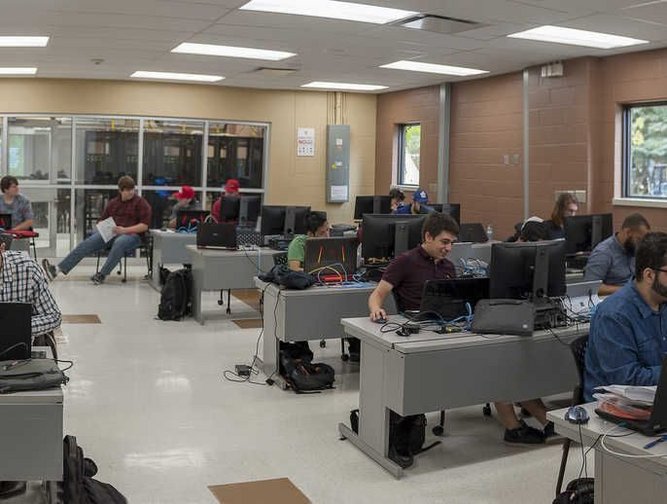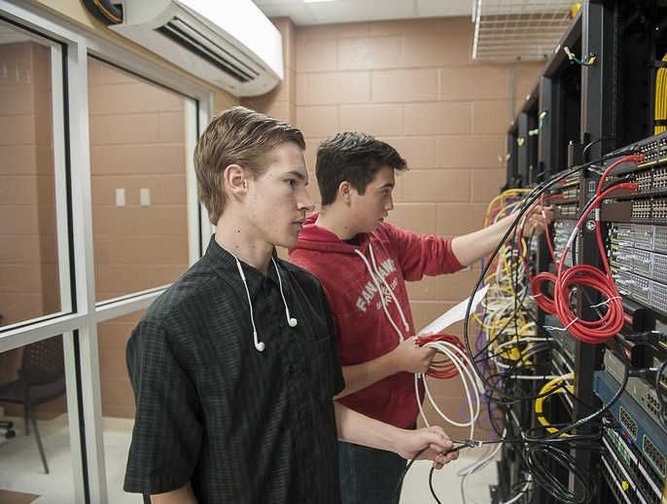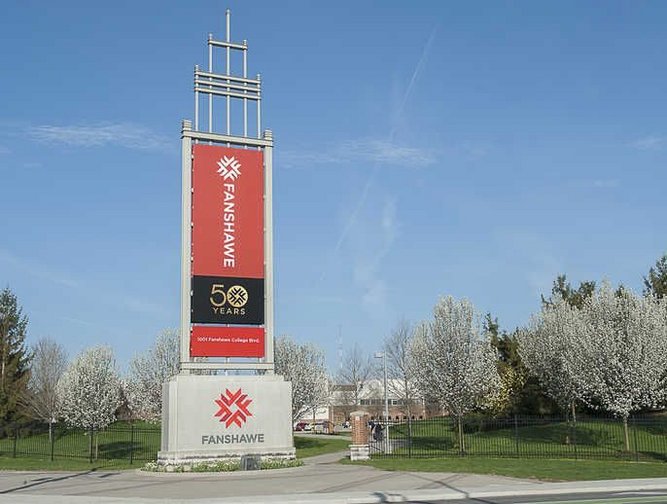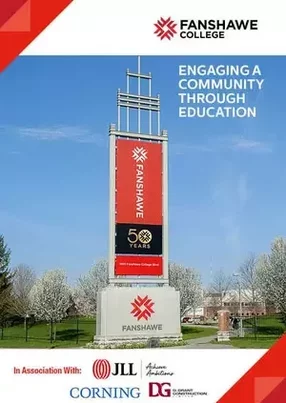Fanshawe College, or to give it its full title, Fanshawe College of Applied Arts and Technology, has just celebrated its 50th anniversary. Established at London, Ontario in 1967 as the successor to the Ontario Vocational Centre, it has since grown to become one of Canada's largest further education institutions, with additional campuses at Simcoe, St. Thomas and Woodstock. It enrols close to 45,000 full-time, part-time and online students each year, not only from Canada and south-western Ontario, but from some 80 other countries around the world, and offers more than 200 degree, diploma, certificate, graduate certificate and apprenticeship programmes. Subjects available include applied arts, business, healthcare, human services, hospitality and technology, and Fanshawe also provides re-skilling and skill upgrading opportunities for mature learners sponsored by business and industry or by government.
Since 2013, Peter Gilbert been Chief Information Officer (CIO) of this hugely important regional college, adding a second key role to his portfolio in February 2017 – that of Chief Infrastructure Officer. So, he's a double CIO: “Over the last couple of years the opportunity arose to expand the purely IT work more into the actual running and building of our facilities, and it became clear that many of the challenges facing an IT department are shared by a facilities department.” Smart facilities, he explains, depend so heavily on IT these days that the old demarcations are disappearing.
As an example, he cites parking. Anyone visiting a large campus anywhere in the world will know what a pain it is to drive around looking for a space – and the cost in wasted time and missed appointments can be significant. Fanshawe has more than 3,000 parking spaces for students and staff, all on the flat, and of course there are never enough of them at peak times. “We're now starting to look at smart parking solutions that would direct people to available parking, rather than having to drive round and round,” says Gilbert. Part of the solution would be for many more people to use public transport, but for those who need to use a car, not having to use up time and fuel looking for a parking place would help achieve the college's carbon reduction goals. Gilbert is considering introducing a card-based entry system, which would also facilitate payment.
Another example is that of physical security. Issuing and tracking keys is a poor way to ensure that buildings are secured: a centrally controlled smart card system is much more robust, and would allow the campus or a section of it to be locked down fast in an emergency. “We're taking the best project management practice from both facilities and IT. Project management was born in the construction industry, and they're very good at it, but over the years IT has adapted that and become good at that as well. But construction projects often end when a building is handed over whereas IT extends right into operation and maintenance.”
Tracking and reporting on its physical assets while at the same time being able to respond in a timely manner to service requests from facilities managers in all parts of the campus has been made a lot easier by IT initiatives at Fanshawe. In particular, partnering with real estate services provider JLL Technology Solutions, it implemented ARCHIBUS facilities management software to support all its facilities operations. The software-as-a-service (SaaS) solution was deployed within the JLL Cloud environment within just three months.
Gilbert is enthusiastic about the opportunities for IT and innovation to make a difference to the student experience too. With an increasing number of students on campus, it's important to automate as many of the paper-based enrolment processes as possible, he says. And once the students are admitted, they quickly learn that Fanshawe will help unlock their potential in ways they had not expected. “Innovation is at our core, and we're always looking for ways to push the envelope. We introduced iPads into learning several years ago, which really unlocked the potential of students that come to us with fewer academic qualifications, or who had additional challenges such as autism.”
See also:
-
How Aecon Group serves the construction industry with best-in-class technology and employee support
-
Australian Cranes & Machinery: Supporting the present and future needs of the construction industry
iPads have been around a while now, but young people are increasingly buying drones, which are readily available. In anticipation of new laws surrounding usage, Fanshawe introduced a drone course and encouraged students to become certified operators. It was a far-sighted decision: “We're seeing regulation coming in, and I think we're well positioned to help train people in the proper use of that technology.”
Drones are an engaging, and far from being just fun technology. Gilbert believes one of the benefits of the college system lies in its use of employer groups to help advise curriculum development. “Technology is creeping into every aspect of the world, and getting employers to help us design the next generation of courses leads to a two-way learning process. Sometimes our students will enlighten the employer, other times the employer will enlighten the student that they employ. I think a lot of our future innovation will come from the innovation that's happening in the many businesses we serve with our graduates.”
This virtuous circle is epitomised in the close relationship Fanshawe has with the construction industry. The London Home Builders' Association (LHBA) is a case in point, providing a lot of feedback to college building programs. “They also create research opportunities for our students as well,” he adds. “One of our goals is that every student who goes through Fanshawe should have at least one applied research experience as part of their time here. Construction firms always have projects under development that need tweaking before they become the new mainstream product, and our students are more than happy to assist in some of that applied research.”
The Centre for Research and Innovation (CRI) is Fanshawe College's Research Office and Industry Innovation Centre (IIC). CRI links industry, business and community partners with Fanshawe student and faculty researchers to develop research and innovation projects and programmes, and serves as the College's liaison to external funders. Gilbert is excited about the concept of an 'Innovation Village' that would be much more than a fancy name for a community hub. “It's built on the African proverb that 'it takes a village to raise a child'. It's the antithesis of the old teaching model where a student comes in, takes a course and leaves. What we're trying to work towards is a 'village', part physical and part virtual, where the student can encounter professors and also people from different professions, some of them retired perhaps, who want to mentor and indeed learn from new students.”
He sketches a campfire scene round which young people learn from the people who have done the job or lived the experience in the past; sharing experiences, but also reaching out to others from different disciplines. “You might introduce somebody into the village that has financial background to a group that's talking about architecture questions or a marketing person to come in and help take ideas out into the community, or socialise them. It takes more than just a few professors to make a difference for a person. It's the whole experience, involving a variety of people and materials that they could experiment with,” says Gilbert.




